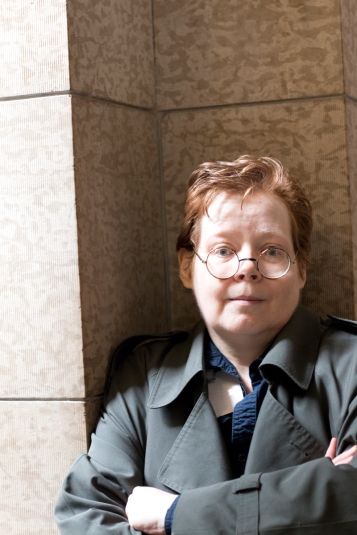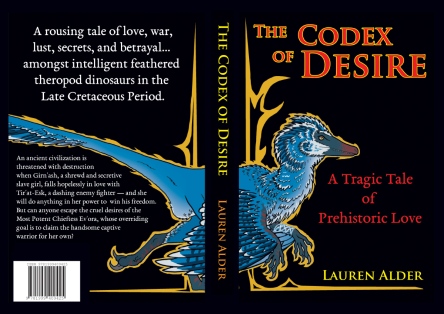Today, Writing Wicket showcases Lauren Alder.

Lauren was born and raised in Winnipeg, where she currently
lives with her husband of 23 years. She is a freelance commercial
artist, a past Eisner Award nominee, and a lifelong science nerd with
an enduring interest in dinosaurs, history, and the sociology of food.
Codex is her first novel, but will certainly not be her last.
I asked Lauren:
Q: If you could be any author, who would it be and why?
That’s a very interesting question. Off the top of my head, I would have to say JK Rowling, both because of her rags-to-riches story and because of her incredibly philanthropic generosity, which I admire tremendously. She came from a very rough place, economically speaking, and when she became successful she did not forget those who were suffering the same burdens.
Q: What is the first book that made you cry?
I don’t think I’ve ever cried over a book, but while reading Watership Down for the first time I found passages of such lyrical and mythic beauty that I was nearly moved to tears.
Q: What are your favourite literary journals?
*chuckles* Okay, it’s confession time: I don’t read any literary journals, although I most certainly should. Do you have any especially useful ones to recommend?
Q: What are common traps for aspiring writers?
Editing as you go. No, no, NO — that’s an almost sure-fire recipe for stalling the entire writing process, or at least it is for me.
Thinking that you have to write with an eye toward “the next best seller”, rather than writing the stories YOU want to tell. Don’t worry about following the latest trend: by the time your novel is finished that trend will probably be in the trash bin, and if you’re writing for purely mercenary reasons I believe it will show in the storytelling. Nothing works as well as sincerity, as believing with all your heart in what you’re writing, when it comes to writing a story that will grip readers and (perhaps) actually sell.
Q: What kind of research do you do, and how long do you spend researching before beginning a book?
For Codex, there was a lot of research involved but much of it was conducted in the midst of the writing process. For the first draft, I dropped in a lot of “placeholder information” (for example, saying that my dinosaurs could brew beer, or that fossil macro-preparation is done a certain way, or that a certain flower existed 67 million years ago), then went back in the second draft and double-checked that information, filling in more accurate details. (Turns out the dinosaurs wouldn’t have had beer, which involves hops, but they might very well have had ale and wine, which can be created from a variety of substances. So out went the beer reference!)
One of the hardest pieces of information to dig up for Codex concerned the length of a lunar month 67 million years ago. It must have taken me a good hour and a half on Google to unearth an academic paper on the subject, and another forty-five minutes of reading through the paper to finally ferret out the single nugget of data I needed (that the lunar month was less than an hour shorter). I felt a bit foolish and deflated, truth be told: all that work, and the end effect on my narrative was precisely zero! But research sometimes yields exactly that result.
In contrast, for the book I’m currently writing, Where Darkness Falls, the action is set in Chicago, which is of course a real-world place, and therefore I had to do a lot of research before starting the writing process so that I could get things at least three-quarters right and wouldn’t have to go through the whole book in the macro-edits and do massive (and migraine-inducing) rewrites. I’d say I’ve spent several hours on hard research in relation to that project, and I’ll have to keep looking things up as I finish the first draft. (Don’t even get me started on the research required to come up with the future tech elements, since the novel is set in 2038. There’s another few hard hours in there on top of everything else!)
Q: What is your favourite childhood book?
Manxmouse by Paul Callico. A charming little book with plenty of dark edges to it, which thrilled me as a child!
Q: What is the most difficult part of your artistic process?
Editing is, of course, a horrible marathon slog of effort both brutal and precise, hammering the hot bloom of my first draft and hoping that I end up with enough pure metal to craft something decent. But in terms of the first draft, watching my characters emerge into their own active psychological life is both awesome and nerve-wracking because as they “come alive” they also become capable of heading off in their own directions, taking the plot along with them. Having to give up certain cherished aspects of my outline because the characters have different ideas is extremely difficult, but I’ve learned to trust the Writing Machine ™ inside my head, and let my characters take the reins.
Q: Does writing energize or exhaust you?
It depends on my base mental state at the time. I struggle with treatment-resistant depression, and when the Black Dogs are biting hard I find writing to be an exhausting enterprise. When they’re just nibbling, or are absent, writing invariably energizes me and makes me feel like I’m on top of the world.
Q: Did you ever consider writing under a pseudonym? If you write under one now, why did you do so?
I write under a pseudonym because my real last name is “Smith”, and on Amazon they can sometimes kick reviews left by people with the same last name as the author. Given how common “Smith” is, I elected to choose a much rarer last name — and so Lauren Alder was born.
Q: If you could start over again in your writing career, what would you do differently?
I might attempt my first novel at a younger age (I am currently 53, so perhaps in my early 40s). However, that 1.25 million words of fan fiction I mentioned earlier was what taught me good writing practices, how to structure a narrative, etc., so ten years ago I might not have been ready to tackle a full novel. There’s no way to tell short of finding a time machine and heading on back to give it a shot.
Q: If you could change one thing about yourself, what would it be?
I would rid myself of treatment-resistant depression, which has robbed me of so many productive hours on all artistic fronts and taken so much joy out of my life on a regular basis.
Q: What was an early experience where you learned that language had power?
Nothing comes to mind, I’m afraid, that isn’t related to depressingly dark memories which I’d rather not share.
Q: Do you want each of your books book to stand on its own (if you’re writing more than one, that is), or are you trying to build a body of work with connections between each book?
Each of my books stands on its own. Codex has a sequel in the wings, but I’ll see how the first novel does before starting work on that.
Q: Are there any books you didn’t like and couldn’t finish reading? Why?
The first book of the “Twilight” series. I decided to read it because at the time it was very much in the zeitgeist and I wanted to analyze it, to see what made it so successful. Alas, I only got as far as the vampire baseball game before I had to close the book and admit defeat. The writing was (in my opinion) just so lackluster, the characters so unengaging, and the narrative not intriguing in any way. I couldn’t bring myself to finish it.
Q: How often do you write?
Because I’m also a freelance commercial artist, I tend to alternate writing work with visual arts work. When I’m in a writing phase, I try to write every morning for at least one to two hours, with the goal of producing 1000-2500 words. A writing phase can last for days, or for weeks. Inevitably, though, I need to switch to visual arts at some point to change my mental focus, and might remain in that headspace for days or weeks again, before switching back to writing.
Q: What challenges have you faced in publishing?
The first challenge I faced was pitching an extremely high-concept novel (tragic dinosaur love triangles?) to 113 agents, which met with resounding failure (although one agent did say that if I wrote another novel, she’d like to see it). To be honest, I didn’t expect to sell Codex to an agent or publisher, so after four months of pitching I went straight to self-publishing.
And my goodness, the learning curves involved! I thought writing the novel was the hard part, but no — editing was an even bigger mountain to climb, followed by registering for Amazon and Smashwords, and then… the formatting. That formatting nearly killed me because I am not a tech-savvy person, and furthermore all the instructions were for Microsoft Word, which as a Mac user I was quite unfamiliar with. But I managed to wrangle my way through it, and now I’m prepared (somewhat) to go through the same progress again on my next novel, if need be.
Q: What’s the best way to market indie books?
When I find that out, I’ll let you know.
In all seriousness, though… at the moment I’m trying to get the word out through trading author interviews (like this one), as well as holding a book launch at a local big box bookstore and taking a dealers table at my local science fiction convention. I’ve also approached several bloggers to do reviews, and emailed a local feminist radio show to see if they’d like to interview me on-air (they said yes).
I’m very much in the “baby steps” stage of marketing, learning as I go.
One tip that does come to mind is: Have a killer one-page press release ready. There’s a FB group called “Authors in the News”, run by a very savvy media maven named Kristin Spiers, where you can find the same publicity release template that I used. It’s straightforward and easy to follow, and Kristin offers some amazing additional services.
Q: What is your biggest accomplishment (in writing or otherwise)?
Finishing Codex and getting it published was a huge accomplishment, but in terms of the profession I make money at, being nominated for an Eisner Award in 1996 was a moment of tremendous pride for me.
Q: What was the best money you ever spent as a writer?
The $45 (or thereabouts) that I laid out for my copy of Scrivener. In terms of sheer functionality and all the options it offers for organizing/archiving writing materials (including pictures, video, and even entire webpages), it is simply the most powerful word processing programme on the market, at least in my opinion.
Q: What book(s) have you written?
In August I published my first novel, The Codex of Desire, to both Amazon and Smashwords. However, I also have nearly 1.25 million words of fan fiction on Archive of Our Own, which was my training ground as a writer; there is at least one finished work in my fan fiction corpus which is of novel length (90+K words).
Check out Lauren’s sites:
Purchasing links:
Amazon
Smashwords

+++
C.A. MacKenzie is the author of WOLVES DON’T KNOCK, a psychological drama with elements of thriller, suspense, mystery, romance, and family dynamics. Buy it on Amazon. Also available locally from the author and at other local retailers.
+++
